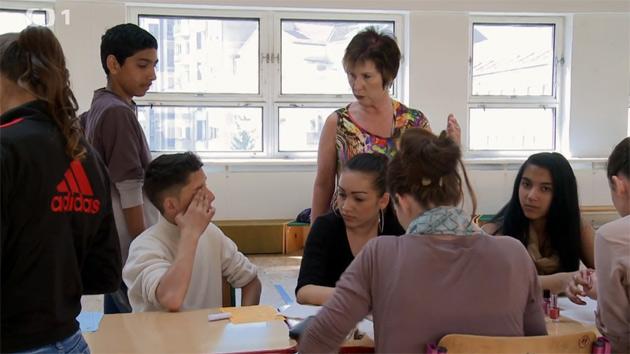Czech NGOs criticize public broadcaster's reality TV show of schools for spreading anti-Roma prejudice

Eight nonprofit organizations including ROMEA, o.p.s. have sent the Council on Radio and Television Broadcasting (RRTV) an open letter regarding public broadcaster Czech Television’s "Class 8 A" (Třída 8.A.) reality television series. In their view the series, which began last year, contributes to the spread of prejudice and stereotypes about the Romani minority.
The In IUSTITIA public benefit corporation initiated the letter. In it the NGOs call for the program not to be continued and for its producers to apologize to the those involved.
The main message of the open letter is that the "Romani-ness" of the pupils in the series is being presented as a problem and as the main cause of their deficient performance at school. "Class 8A is almost exclusively Romani, and it is the pupils’ Romani-ness that is presented as the source of their problems. It is not clear from the program whether some of these children might be suffering, for example, from attention deficit disorders, and the social background of each child is also ignored," the organizations write.
The series is, therefore, enhancing stereotypical notions about Romani people as ineducable, notions that are deeply ingrained in the Czech Republic and that manifest themselves, for example, in the segregation of Romani children into "practical schools", which has been greatly criticized. "Even though the program originally set itself the aim of sparking public debate on the situation of our schools and the topic of Romani segregation, the resulting effect is completely the opposite, at least judging by viewers’ reactions online," said Markéta Nešporová of In IUSTITIA.
The program was inspired by a Swedish documentary reality show. That program captured an experiment in which three new teachers with experience from teaching at various elite schools spent half a year teaching at an exclusively Romani primary school.
The Swedish teachers’ task was to motivate the children to learn and to introduce new methods into the school’s instruction. "In the eight episodes of the Czech program that have been broadcast, however, audiences did not watch capable educators and motivated pupils, but rather the exact opposite – clueless teachers and children who have their number, so to speak," Nešporová said.
The authors of the open letter emphasize that providing instruction to disadvantaged children is a specific challenge and that its successful management requires different approaches. They also point out the ethical problems related to the public broadcaster producing such a genre for television.
"In order to acquire material for the program, the naiveté of these teenagers and, to a significant degree, that of their legal representatives was exploited – they may have believed that involvement in the television program might somehow improve their children’s prospects," the letter says. Commentator Helena Zikmundová, in a piece entitled "Teaching Brno, or, Who will rescue 8A?", published on news server Aktuálně.cz, compares the series to a similar program that ran in 2011 in Great Britain.
"Even though [the British] program did not focus on an especially troubled school, we could see practically everything in that program that we observe in 8A – a general clamor, children running around the classroom, lack of concentration, lack of interest… In Essex, too, the older children sometimes had a problem with reading and were dealing with even more depressing, serious concerns such as pregnancies – there, too, the staff were sometimes desperate, but the overall atmosphere was different. The teachers in the UK seemed to have a better idea of what they were doing and why, they had evidently been given different training and got much better backup, and they were capable of offering more effective support to the children. Class 8A, by comparison, is mainly a documentary about one big badly-functioning system that the people in the field pay the price for. Unfortunately, however, for the less sophisticated viewers it will probably serve as yet another argument for hating these people and remaining indifferent to their problems," Zikmundová writes.
On the program’s website, Czech Television states that its intention was to respond through the program to a situation in which exclusively Romani classes are not legally permitted and the Czech Republic is repeatedly criticized by international institutions for indirect segregation, but through the influence of various circumstances classes are created in which there are mostly Romani children. The broadcaster also notes that its crew had experience with filming a program with the same format in Slovakia, where it produced the 16-part series "Class 9A" (Trieda 9) to a great response, particularly from education experts.
Kamila Zlatušková, a creative producer at Czech Television, worked on"Class 8A" with Lukáš Franta, who wrote the screenplay. Both also worked on the award-winning series "Ptáčata" (Birdies), which also followed a class of Romani children over time.